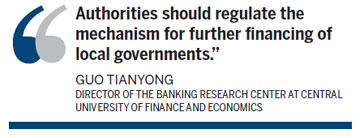Wen: Government debt safe, controllable
Updated: 2012-01-31 09:15
By Wei Tian (China Daily)
|
||||||||
BEIJING - China's government debt is at an "overall safe and controllable" level, said Premier Wen Jiabao, who pledged that funding for key projects would be ensured and steps would be taken to gradually digest the risks.
"Through clean-ups and regulation, the trend of expanding investment vehicles has been effectively contained," Wen said.
|
|
Wen's comments, reported in the People's Daily on Monday, were made in a speech at the Central Financial Work Conference in early January.
The National Audit Office said earlier this month it had uncovered 531 billion yuan ($83.8 billion) in irregularities involving local government debt, which amounted to 10.7 trillion yuan as of the end of 2010.
The scale of China's local debt has aroused concerns among investors, and some fear that defaults would cause a chain reaction and threaten the stability of the country's banking system.
But Wen said the majority of local debt was in the form of "high-quality assets", such as infrastructure, that had healthy cash flow and promising returns.
Wen warned against a simple approach of hitting the brakes on local debt and called for gradual solutions to the problem. "We must avoid turning local risks into comprehensive, systemic risks," he said.
Meanwhile, the funding needs of key construction projects approved by the government, such as affordable housing projects, must be ensured, he said.
He urged greater attention to, and control of, systemically important financial institutions, and stressed the role of private credit in the world's second-largest economy, given that it was properly regulated.
Wen reiterated that the nation would "further improve the renminbi exchange rate formation mechanism and strengthen the flexibility of the renminbi exchange rate in both directions".
"Declining revenue for local governments and a large volume of maturing debt have made local debt a focus of emphasis in China's financial stability this year," said Guo Tianyong, director of the Banking Research Center at the Central University of Finance and Economics.
"While properly handling the debt stock, authorities should regulate the mechanism for further financing of local governments" and consolidate their debt payments into the budget, Guo said.
Wang Tao, an economist at UBS AG, said that declines in the property market and the risks of local debt would not generate systemic risk in the near future, because the nation's policy stance had shifted to stopping the growth rate from falling too fast.
"The government is seeking a balance between maintaining growth and dealing with the negative effects left over from the last round of fiscal stimulus," Wang said.
China has set a target of 8 trillion yuan in new local-currency loans and 14 percent growth in broad M2 money supply for 2012, Reuters reported, citing sources familiar with government plans.
This suggests a rise from 7.47 trillion yuan in new bank loans and annual M2 growth of 13.6 percent achieved in 2011, implying a further loosening of policy by the People's Bank of China to support the economy as growth weakens and inflation eases.

 Relief reaches isolated village
Relief reaches isolated village
 Rainfall poses new threats to quake-hit region
Rainfall poses new threats to quake-hit region
 Funerals begin for Boston bombing victims
Funerals begin for Boston bombing victims
 Quake takeaway from China's Air Force
Quake takeaway from China's Air Force
 Obama celebrates young inventors at science fair
Obama celebrates young inventors at science fair
 Earth Day marked around the world
Earth Day marked around the world
 Volunteer team helping students find sense of normalcy
Volunteer team helping students find sense of normalcy
 Ethnic groups quick to join rescue efforts
Ethnic groups quick to join rescue efforts
Most Viewed
Editor's Picks

|

|

|

|

|

|
Today's Top News
Health new priority for quake zone
Xi meets US top military officer
Japan's boats driven out of Diaoyu
China mulls online shopping legislation
Bird flu death toll rises to 22
Putin appoints new ambassador to China
Japanese ships blocked from Diaoyu Islands
Inspired by Guan, more Chinese pick up golf
US Weekly

|

|







